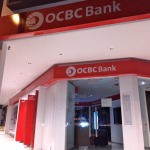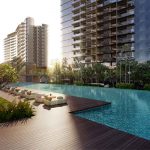Opportunities for occupiers resulting from changes of conditions in the Singapore office property market
- Impact of COVID-19 outbreak not apparent in Singapore office property market as CBD Grade A monthly rents stayed flat QOQ in Q1 2020 at S$10.09 per square foot
- Technology, Media and Telecommunications and Flexible Workspace sectors continued to drive space demand in Q1 in Singapore office property market
- Total office or mixed office developments investment volumes fell 32% QOQ to S$746 million in Q1 amid weaker sentiment in Singapore office property market
- Colliers forecasts rents to hold up in 2020 in Singapore office property market but could decline by 4% in 2021

Colliers International on April 7 published its latest research report which examines the performance of the Singapore office property market in Q1 2020 and its prospects ahead.
Rents
Data tracked by Colliers Research showed that average CBD Grade A rent was unchanged quarter-on-quarter (QOQ) at S$ 10.09 per square foot per month (psf pm), while Grade B offices moderated its rental decline to 0.3% QOQ at S$8.44 psf pm. On a year-on-year (YOY) basis, both segments saw rental increases of 4.7% for Grade A offices in the CBD, and 4.8% for Grade B offices.
Evaluating the data, Colliers Research notes that the impact of COVID-19 on rents was probably not apparent in Q1 2020 and it expects the negative impact of the pandemic could start to show in Q2 2020. That said, it may not jolt the office market as significantly as past crises – the outbreak of Severe Acute Respiratory Syndrome (SARS) in 2003 and the Global Financial Crisis (GFC) in 2008.
Tricia Song, Head of Research for Singapore at Colliers International, said, In the 2003 SARS episode, the effect was noticeable after a one-quarter lag. While the COVID-19 pandemic could last longer than SARS, we observe that the current office market has lower vacancy and supply than it did in 2003. Rental levels are also not at “bubble” levels seen in the run-up to the Global Financial Crisis (GFC) in 2008. However, the odds of a global recession have risen and pose downside risk to demand and rents. We expect a 4% rent decline in 2021 in view of slower demand and high forward supply.”
Office rents and vacancy, Q1 2020
| Average Gross Effective Rents (SGD psf pm) |
QOQ Change (%) | YOY Change (%) | Vacancy (%) | |
| Grade A (Premium Tier) | ||||
| Raffles Place / New Downtown | 12.27 | 0.0% | 5.6% | 3.2% |
| Grade A | ||||
| Raffles Place / New Downtown | 10.51 | 0.2% | 3.4% | 3.9% |
| Shenton Way / Tanjong Pagar | 10.31 | 0.0% | 6.2% | 2.3% |
| City Hall | 10.35 | 0.1% | 5.2% | 3.0% |
| Beach Road / Bugis | 9.38 | 0.0% | 6.8% | 0.3% |
| Orchard Road | 9.14 | 0.0% | 0.9% | 4.1% |
| CBD Grade A Average | 10.09 | 0.0% | 4.7% | 3.1% |
Source: Colliers International
Note: Average gross effective rents are benchmarked to a full-floor space in mid-zone level; conservative figure tending towards lower-end of rental range for a property. Effective rent refers to average rate payable over the lease term after accounting for incentives.
* Adjusted due to change in basket of properties
Vacancy and take-up
Demand drivers in Q1 2020 continued to be the TMT (Technology, Media and Telecommunications) and flexible workspace sectors. Demand from TMT included An Xing Technologies occupying One Marina Boulevard, as well as Shutterstock and IRESS Market Technology in 18 Robinson.
New space take-up at 18 Robinson in Q1 helped to push its occupancy from 67.3% to 95.3%. This in turn, resulted in further tightening of CBD Grade A vacancy from 3.4% to 3.1% in Q1. In view of the limited supply, Colliers Research anticipates vacancies to remain below the 10-year historical average of 6.2% in 2020-2021.
Rick Thomas, Head of Occupier Services in Singapore at Colliers International, said, “As a result of the pandemic and safe distancing measures, many companies have progressively pivoted to remote working, having employees work from home or multiple locations. We believe the COVID-19 outbreak will profoundly change the way people work and could in fact fast track the adoption of new technologies, flex-and-coreTM strategy, and demand for wellness certified buildings. At this juncture, we would recommend occupiers to continue to invest in technology and review their real estate space requirements amid shifting market dynamics.”
The flexible workspace sector is set to expand its footprint further in the coming quarters: JustCo is opening new branches at OCBC Centre East (45,000 sq ft) and Centrepoint (60,000 sq ft) in Q2 and Q3 2020 respectively; The Great Room is occupying 37,000 sq ft of space at the new Afro-Asia i-Mark building in Q2 2020; and Arcc Spaces will launch its flagship space (19,000 sq ft) at One Marina Boulevard in April.
The CBD Grade A supply will be muted through 2021, with annual expansion averaging 3% of stock versus 5% for the last five years. The next major supply hike – representing about 7% of stock – is due in 2022.
Investment Sales
Total office or mixed office developments investment volumes fell 32% QOQ to S$746 million in Q1 2020, bringing the rolling 12-month volumes to S$7.4 billion (down by 2.6% QOQ).
Sales during the quarter was driven mainly by the S$648 million transaction of China Square Central as a result of the merger between Frasers Commercial Trust and Frasers Logistics & Industrial Trust announced prior to the COVID-19 outbreak. Excluding this deal, investment sales would have fallen 91% QOQ with just three strata transactions at Samsung Hub and Suntec Tower One.
Notable Office Transactions
| Property | Price (SGD million) | Price PSF NLA (SGD) | Micro-Market | Remaining Tenure |
| China Square Central | 648 | 1,661 | Raffles Place/
New Downtown |
76 years |
| Samsung Hub | 50 | 3,817 | Raffles Place/
New Downtown |
806 years |
| Suntec Tower One (2 strata transactions) |
48 | 2,400 – 2,580 | City Hall | 68 years |
Source: Colliers International * Price on Gross Floor Area
Colliers Research believes capital markets may stay subdued in H1 2020 in view of the pandemic, which has forced governments around the world to institute strict measures to contain the outbreak. In the near-term, concerns about the economic fall-out from the COVID-19 outbreak will cloud market sentiment considerably. Over the next few years, however, real estate investment sales prospects remain optimistic on a favorable interest rate outlook and capital allocation to Asia.
Jerome Wright, Senior Director, Capital Markets in Singapore at Colliers International, said, “Singapore’s strong policy response to COVID-19 should instill confidence in occupiers, talent and investors, reinforcing Singapore’s safe haven status. When the situation gets back to normal, the real estate market will be among the first to recover. There will be real estate opportunities as businesses affected by COVID-19 will have to reassess their options.”
With fewer transactions in the quarter, the average imputed capital value of CBD Grade A office properties stayed flat QOQ at S$2,518 psf. Colliers’ valuation team, meanwhile, said cap rates were unchanged at a range of 3.15% and 3.50% in Q1 2020, as rents and capital values remained flat.






